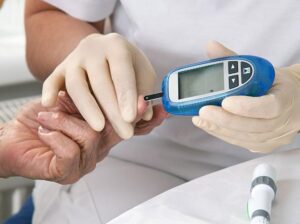5 Important Diabetes Tests for Sugar Patients
Constant thirst, hunger, or sudden and drastic weight changes may be signs. However, people with diabetes, especially Type – 2 diabetes, don’t notice these signs readily. A review published in the Medical Clinics of North America in 2015 suggests that the early stages of diabetes go unnoticed, despite many indications.
It is vital to identify and thwart diabetes before it becomes a severe problem. Various tests show whether you have diabetes. For instance, a fasting or random blood sugar test lets you know if your blood sugar levels are under control. Normal levels for this test should be more than or equal to 126 mg/dl.

5 Important Tests for Diabetes
As per the CDC, people with Type – 1, 2, or gestational diabetes should get their blood sugar levels tested more frequently than others. You can undergo many tests to verify if you have diabetes. Your healthcare professional will conduct these tests, and the American Diabetes Association (ADA) says that if the results are as expected, you won’t need to undergo a second test.
Various health complications accompany diabetes that can affect the eyes, gums, kidneys, feet, and skin. So, it is essential to undergo a diabetes blood test. If you are unsure what tests you will need to undergo, here are the five most important tests for people with diabetes.
A1C Test: The A1C test indicates the average blood sugar level over two or three months. The test measures how much sugar is in your hemoglobin. It shows how well you are keeping your sugar levels at bay. You should get this test done at least twice a year. Consult your doctor about the A1C test. Ask them what works for you and how often you should test before undergoing one.
- Fasting Blood Sugar Test: The fasting blood sugar test is a standard measure of blood sugar levels. You can perform this sugar test at home yourself. Check your blood sugar level in the mornings before breakfast using suitable kits. If the reading is between 70 mg/dl and 99 mg/dl, then your blood sugar level is normal.
- Random Blood Sugar Test: You can also conduct random tests to check your blood sugar level even if you have not eaten. ADA suggests that you have diabetes if the random tests indicate more than 200 mg/dl blood sugar levels. You can do a random blood test using a suitable kit, just like the fasting blood sugar test.
- Oral Glucose Tolerance Test: The Oral glucose tolerance test is usually conducted during pregnancy. In this test, blood is first drawn, and you must drink glucose syrup. After that, blood is drawn again at intervals between 30 and 60 minutes and up to three hours. The oral glucose tolerance test ascertains how well your body can handle glucose.
- Lipid Profile: Diabetes can cause cholesterol levels to surge, and high cholesterol levels lead to various heart-related diseases as they cause the blood vessels to narrow. So, while high cholesterol levels may mean you are at risk of developing heart ailments, low or healthy cholesterol levels indicate a healthy heart and low risk. You should get your cholesterol levels checked at least once a year. Lipid profile tests indicate how much cholesterol you have in your blood. The total cholesterol in your blood should not be more than 200 mg/dl. Similarly, LDL cholesterol levels should be less than 70 mg/dl, and HDL cholesterol levels should be greater than 50 mg/dl. Also, triglyceride cholesterol levels should be less than 150 mg/dl.
Why Should Sugar Patients Test for Diabetes?
Testing blood sugar levels is a vital aspect of managing diabetes. Blood sugar tests can give you valuable insights about the disease, its risks and complications, and, more importantly, how to deal with them. Likewise, there are many other advantages of performing a test.
- Testing blood sugar levels can help you learn and monitor the effects of diabetes medications.
- These tests let you know your blood sugar levels. That is, whether they are high or low.
- You can track how well you manage diabetes in terms of diet and exercise with the help of a diabetes test.
- Blood sugar level tests also help you understand how factors such as stress, and other illnesses, affect sugar levels.
Conclusion
You should get your diabetes blood test done by a reputed diagnostic like SRL Diagnostics. The blood sugar target range that your doctor sets may depend on factors such as the Type and severity of the disease, how long you have lived with it, overall health conditions, and complications. It may also depend on other factors, such as pregnancy or underlying health conditions.
So, ask your doctor about the specific target range and how it impacts your condition. While the ADA recommends between 80 and 130 mg/dl before meals and less than 180 mg/dl two hours after eating, it depends on various factors, such as age or preexisting health conditions.